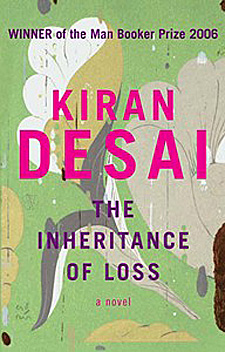"Briefly visible above the vapor, Kanchenjunga was a far peak whittled out of ice, gathering the last of the light, a plume of snow blown high by the storms at its summit.' (p.1) So we read on the first page of Kiran Desai's The Inheritance of Loss " the 2006 Booker Prize-winning novel.
This same Himalayan monolith " immovable and on the horizon " features decisively, too, on the novel's last page, but by this time age-old cultural grievances and age-new materialistic globalisation have had their way with the book's small group of central characters.
 The novel is concerned about the intimacies of life for Jemubhai (a retired judge), Sai (his orphaned granddaughter), Gyan (Sai's tutor and love-interest), the judge's cook, Gili (the cook's son), and their circle of acquaintances. But it is also concerned with the macro forces that act on each, revealing them as relatively powerless, as they live out their lives in the north-east Indian town of Kalimpong, or in the cafés and restaurants of North America.
The novel is concerned about the intimacies of life for Jemubhai (a retired judge), Sai (his orphaned granddaughter), Gyan (Sai's tutor and love-interest), the judge's cook, Gili (the cook's son), and their circle of acquaintances. But it is also concerned with the macro forces that act on each, revealing them as relatively powerless, as they live out their lives in the north-east Indian town of Kalimpong, or in the cafés and restaurants of North America.
The author successfully weaves together the microcosm with the macrocosm, the fundamental with the apparently incidental. Of a Christmas celebration she writes: "And there were presents of knitted socks from the Tibetan refugee village, the wool still with bits of straw and burrs that provided authenticity and aroused extra sympathy for refugees even while it irritated the toes.' (p.152)
Desai, at 35, is the youngest woman ever to win the Booker. She follows in both a family tradition (her mother has been shortlisted for the same award three times) and a literary tradition (Booker Prize-winners set in India such as Arundhati Roy's The God of Small Things, and Salmaan Rushdie's Midnight's Children). As with these other classics, the prose is rich and the suffering ubiquitous.
Each of the characters are gradually revealed as products of their past " both recent and distant (the inheritance of loss). Each, at least in part, also appears disconnected from their present surroundings. Jemubhai, for example, was severed from his Indian roots by his Cambridge education. Once the pride of his family and village, he now lives an isolated life in his large run-down house finding joy only in his dog, Mutt.
By and large Desai paints the world as one that lacks grace (in the undeserved favour sense). The USA is for Indians a place of alienation, but a place for accumulating wealth. India, however, is no utopia. India drains you of what you have. It is a brooding country where submerged forces of cultural discontent move slowly but relentlessly. As a Nepalese uprising looms, Desai writes: "The men sat unbedding their rage, learning, as everyone does in this country, at one time or another, that old hatreds are endlessly retrievable.' (p.161)
Religion is presented as deeply embedded in both Indian and American culture, but is spiritually peripheral for the main characters and, we might suspect, Desai.
""Jesus is coming," read a sign on the landslide reinforcements as they nose-dived to the Teesta. "To become a Hindu," someone had added chalk underneath.' (p.194)
Christianity is observed with wry displeasure. Sai says goodbye "to the perversities of the convent, the sweety sweety pastel angels and the bloodied Christ, presented together in disturbing contrast'. (p.29) Two Indian ladies had a thangkha of a demon at the entrance of their house "to dissuade the missionaries'. (p.44) Bible folk in the USA are "waiting on street corners, getting their moral and physical exercise chasing after infidels'. (p.267)
However, when the judge's dog (the one love of his life) goes astray during a time of political turmoil, he laments the absence of the missionaries " "they would have understood and would have been duty-bound to help'. (p.289)
A discussion in a library on page 200 gives some interesting insights into the comprehension of the previously mentioned issue of grace. The Christian idea of confession and forgiveness is raised. She writes: "The whole system seemed to favor, in fact, the criminal over the righteous. You could behave badly, say you were sorry, you would get extra fun and be reinstated in the same position as the one who had done nothing, who now had both to suffer the crime and the difficulty of forgiving, with no goodies in addition at all.' (p.200)
The librarian says: "We Hindus have a better system. You get what you deserve and you cannot escape your deeds. And at least our gods look like gods, no? Like Raja Rani. Not like this Buddha, Jesus " beggar types.' (p.200)
Sai (or is it Desai?) concludes: "For crimes that took place in the monstrous dealings between nations, for crimes that took place in those intimate spaces between two people without witness, for these crimes the guilty would never pay. There was no religion and no government that would relieve the hell.' (p.200)
No surprisingly, Desai's book makes engaging reading. Her style is evocative, her characters engaging, her ideas stimulating. Her musings pick up and mull over some of the big questions of life " which in the end she leaves unanswered.
Stephen Liggins, a former editor with Anglican Media Sydney, is assistant minister at St Stephen's Penrith.






















